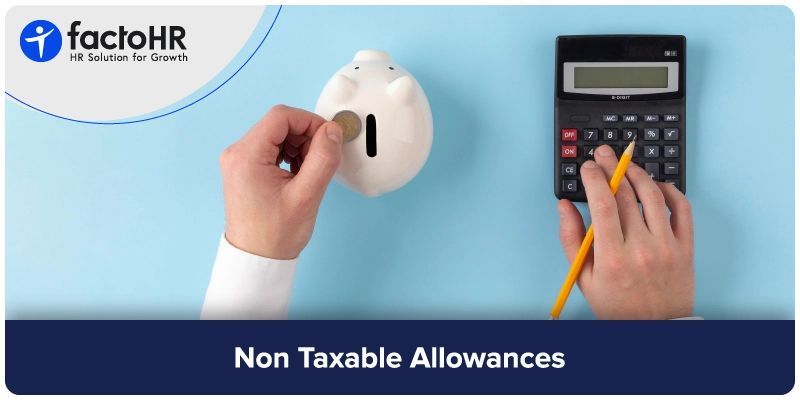Non-Taxable Allowances: Definition, Types & Benefits

Table of Contents
Allowances are the benefits given to the employees from their employer in addition to their basic salary or wages. The allowances assist specific expenses of the employee or compensate for work-related costs. These allowances encourage the employee to work more productively. The non-taxable allowances have an excellent impact on both the employee and the employer in various ways.
Understanding the benefits of non-taxable allowance and their features is crucial. It enhances employee satisfaction and retention. Awareness about these allowances ensures compliance with tax laws and enhances the creation of competitive and effective allowances among competitors. Let us examine the crucial role of tax-exempt allowances and how they contribute to the financial well-being and overall development of the company.
What are Non-Taxable Allowances?
Non-taxable allowances are payments that employees don’t have to pay tax on. They cover work-related expenses like travel and accommodation and are not taxed as part of the total salary.

Types of Non-Taxable Allowances
Travel Allowances
The travel allowances financially assist work-related transportation. The employee can also claim lodging and food expenses along with transportation.
Housing Allowances
Housing Allowances have been given as an HRA component. If the employees pay rent to their House or pay a loan due to their own home, they can assist this House with allowances for their financial support.
Education Allowances
It has been given by the employer to their employees to assist with their educational expenses for themself, their children, or their spouse. It supports the employees in managing their financial requirements for higher studies and enhances their professional development. The tax treatment for education allowances can be fully or partially claimed from the income tax. It is one of the most valuable benefits for the employees.
Health Care Allowances
It is a financial support given by the employer to their employees. This allowance handles all the health related expenses to the employee and their family members. It includes the consultation fee, medicine expenses, diagnosis and treatment related expenses also.
Uniform Allowances
Uniform allowances are financial benefits given to employees for the expenses of uniforms required for the job. They allow the employee to purchase attire that suits their job nature. This allowance helps create uniformity among employees, provides necessary utilities for their health, and ensures workplace dress code adherence.
Tool Allowances
The tool allowances cover the expenses of the tools that an employee requires for their work. They also include the expenses of tool maintenance and tool repair that are necessary for their work. This allowance is generally applicable to employees who are interlinked with trades and professions where specialized tools are needed to manage their work.
Allowances for UNO Employees
This allowance is only applicable to employees of the United Nations Organization (UNO). Due to their international duty assignments, they can be entitled to various allowances and benefits. This allows them to manage expenses while working in different global locations.

Benefits of Non-Taxable Allowances for Employees
The benefits are numerous. Based on their specifications, they can support the various needs of the employees. Understanding the crucial role of tax-exempt allowances can help one use them even better. The most significant benefits for employees have been listed below.
Additional Income to Their Basic Salary
It is an additional Income to the employee’s basic salary. The employee can receive this amount without any deductions. It also increases their take-home salary and assists their essential needs.
Financial Support
It enhances various financial support for employees. Significant expenses include house rent allowances, transportation reimbursement, educational expenses, uniform and tool costs, and health benefits.
Enhances Employee Satisfaction and Retention
It also enhances job satisfaction among the employees. They encourage them to work more productively and remain loyal to the employer. They insist that the employees feel that their work and needs have been recognized by the employer.
Savings
By assisting all basic needs, it encourages the employee to keep some money and insist on saving it under any savings or insurance scheme.
Benefits of Non-Taxable Allowances for Employers
The employer also gets benefits from the duty-free. It is very crucial for all business professionals to handle the tax systems. They can avail themselves of numerous advantages by providing these allowances to their employees.
The benefits that an employer gets includes financial, operational and overall workforce attractiveness. This benefits them to retain their skilled and productive employees with themself. Apart from that the employers can get other significant benefits from providing these allowances to their employees that have been mentioned below.
Financial Management
It controls the pay scale of the employees. Adding various tax-exempt allowances to the basic salary of an employee reduces the overall package that benefits the employer. An employer can retain their skilled employees by providing these allowances.
Compared with incentive plans, the calculation of these allowances consumes less time, as incentive plans take more time and have a complex structure to calculate.
Providing Competitive Package
Providing competitive salary packages benefits the employer in several ways. It supports the employer to provide competitive salary packages. This encourages the employer to motivate their employees, and interns raise the productivity of the employees.
The competitive salary packages impress and retain the top talented and efficient employees with the employer. This is very crucial for industries that have skill shortage employees and high requirements for specific skilled professionals.
Maintaining Productivity and Smooth Workforce
The highly affordable salary packages provide satisfaction to the employee and they feel recognised. It boosts their productivity and excellent performance of the company and makes them more optimistic in the workplace. Also, it engages them with work beyond other disputes. So that the employer can retain the skilled professional and also reduce the cost spent for hiring new skilled professionals.
Maintaining good productivity enables the employer to generate high revenue with efficient salary packages. A smooth and optimistic working environment supports both the employer and the employee in developing their growth to the next level. Moreover, it also increases loyalty and commitment to the work of the employees.
Legal Compliance
It helps the employer to align with the legal compliance in many ways by confirming that they meet the required regulatory requirements and enhancing benefits in legal aspects. These allowances have to be adhered to with the local jurisdiction where the workplace comes under including local, state and federal tax laws.
The employer has to maintain proper documentation and reporting in all legal aspects that have been required from the employer side as per the federal tax laws. The fair maintenance of the documents to support the employer during audits and legal inspections by tax authorities.
Following legal compliance, an employer can avoid penalties, fines, and other legal actions for the concerned authorities. It must ensure non-discrimination and fair and equal treatment of all employees. This helps the employer avoid unfair labor practices.
Strategic HR Management
The integration of tax-exempt allowances in strategic HR management, the employer can build balances, impressive and cost-effective compensation salary packages to the employees. This ensures satisfied recruitment, retention of skilled employees, increased productivity range, and entire organizational performance. The strategic approach ensures the benefits have been aligned with both the employee and the employer.
It confirms that these allowances have to fulfill the requirements of the employees and the company goals etc. A well-drafted strategic approach builds trust and credibility between both employers and employees. Well-defined policies and processes about these allowances provide transparency and fairness in the allowances.
Conclusion
Implementing non-taxable allowances in the compensation packages provides notable advantages for both employers and employees. Regarding the employers, these allowances enhance a cost-effective approach, impress and attract the employee with the fair value of the salary packages along with the compensation so that the employer can retain skilled and efficient employees with them.
The alignment with the legal compliances protects the employer from paying penalties or the fines, restricts tax burdens and enhances a smooth working environment. These allowances reduce the taxable Income and increase the take-home salary.
Moreover, understanding the crucial non-taxable allowances helps employees maximize or utilize their compensation packages effectively. As an employee, you have to be aware of these allowances to make necessary and informed decisions about your expenses and benefits.

Frequently Asked Questions
Are the tax-exempt allowances the Same in All Countries?
It can vary in every country. The tax laws governing these allowances in each country have their own regularization and rules; thus, they should be country-specific tax laws. Consultation with the HR professional or the tax professionals of the country supports both the employer and the employee regarding it..
How Can I Maximize the Support of tax-exempt allowances?
Understanding the benefits of these allowances is the prominent step in utilizing them effectively. You have to be aware of your available tax-exempt allowances with your HR professionals or with the tax professionals. Based on that, you can plan your travel, healthcare, education, and House rental expenses.
Maximizing it allows you to plan your future requirements and expenses based on your benefits or compensations. You can also utilize these benefits to achieve your career and personal goals.
Are the Non-taxable Allowances Changing Over Time?
As we know, non-tax allowances are not static; thus, they can change over time due to several factors. They have to align with the federal law that governs the regulations of tax-exempt allowances. Both employees and employers have to be aware of the present legal norms regarding it for the latest update. This awareness protects you from fines or penalties and also from other legal actions.
Can a Part-Time Employee Get tax-exempt allowances?
Part-time employees are also eligible for these allowances. It purely depends on factors, including employer policies, legal compliances, allowance types, and budget. If you are working as a part-time employee in your organization, you have to approach your Human Resource Professionals to check your eligibility for tax-exempt allowances.
What Happens if I Don’t Use My Non-taxable Allowances?
If you don’t use your non-taxable allowances, you can be treated in many ways, including forfeiting them by the employer and adding them up in subsequent years. It is your responsibility to understand your employer’s policies, so you have to communicate with your employer or HR professionals to clarify the rules and guidelines.
Can I Get Non-taxable Allowances in Cash?
This allowance has not been given as direct cash; only in certain circumstances can it be given as cash to the employees. It can be provided as a reimbursement process; thus, an employee can get the money they spend on certain expenses with proper reports, bills, and documents. As this reimbursement is non-taxable, you cannot get it as direct cash in advance.
Grow your business with factoHR today
Focus on the significant decision-making tasks, transfer all your common repetitive HR tasks to factoHR and see the things falling into their place.

© 2026 Copyright factoHR


